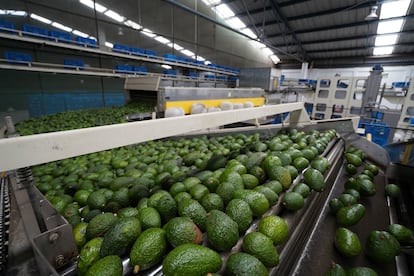Eating an avocado a week could reduce risk of heart disease, new study finds
The 30-year research project noted that the fruit could have a similar effect as olive oil or nuts, but it does have a high cost for the environment

Eating avocados can reduce the risk of cardiovascular disease, according to a study published on March 30 by the Journal of the American Heart Association. Its high levels of fiber and unsaturated fats could be behind the food’s impact on indicators such as cholesterol, as observed in earlier clinical studies.
The conclusion comes from a study that followed 68,780 women and 41,700 men for 30 years. During that period, 9,185 cases of coronary heart disease and 5,290 strokes were detected. After evaluating various factors in the patients’ cardiovascular risk and diets, the study’s authors calculated that consuming half an avocado twice a week reduced risk by 16% compared to those who do not consume the fruit. The team, led by Lorena Pacheco of Harvard’s T. H. Chan school of Public Health, did not note a significant relationship between avocado consumption and strokes.
But beyond observing a correlation between avocados and reduced cardiovascular disease, the study cannot establish a cause-and-effect relationship. Still, Pacheco points out that “there are potential biological mechanisms by which avocados exercise their cardioprotective benefits.” “The main monounsaturated fatty acid found in avocados is oleic acid, a healthy fat that we believe helps reduce high blood pressure, inflammation and insulin sensitivity,” explains the researcher. “In addition, avocados contain plant sterols and soluble fiber, which may lead to lower levels of bad cholesterol,” she adds.
There are people who consume avocado in the form of guacamole. In those cases, there’s a tendency to eat too muchLorena Pacheco, Harvard’s T. H. Chan school of Public Health
Pacheco notes that avocados attract particular interest as a form of replacing foods high in saturated fats. That is partially because they are already a commonly accepted food: the hardest part of changing a diet is often substituting healthier foods for ones that may be more appetizing. It is important, though, for consumers to be cautious about how they incorporate the fruit into their diets. “There are people who consume avocado in the form of guacamole. In those cases, there’s a tendency to eat too much, usually in combination with other fatty foods like chips,” she says. The proper incorporation into the diet would consist, according to the author of the study, in including avocados as an alternative to worse sources of fat such as butter or bacon.
In the analysis published today, the authors found that avocados have an effect on the risk of cardiovascular disease similar to the consumption of nuts and olive oil, two types of food also rich in oleic acid. In some countries, though, the production of avocados has a significant environmental impact. The fruit is native to Central and South America, and inhabitants of the region consumed it for centuries before the arrival of the Spanish. In the globalized market, its production requires large amounts of water. Its transportation from countries such as Mexico to the US or Europe also gives it a high carbon footprint. As EL PAÍS noted in a 2019 article, the cultivation of this fruit has led to violence, deforestation and job insecurity in the Mexican state of Michoacán. As Pacheco and her collaborators show, though, it is possible to consume local avocados when in season and to prioritize food groups with similar health impacts.
Tu suscripción se está usando en otro dispositivo
¿Quieres añadir otro usuario a tu suscripción?
Si continúas leyendo en este dispositivo, no se podrá leer en el otro.
FlechaTu suscripción se está usando en otro dispositivo y solo puedes acceder a EL PAÍS desde un dispositivo a la vez.
Si quieres compartir tu cuenta, cambia tu suscripción a la modalidad Premium, así podrás añadir otro usuario. Cada uno accederá con su propia cuenta de email, lo que os permitirá personalizar vuestra experiencia en EL PAÍS.
¿Tienes una suscripción de empresa? Accede aquí para contratar más cuentas.
En el caso de no saber quién está usando tu cuenta, te recomendamos cambiar tu contraseña aquí.
Si decides continuar compartiendo tu cuenta, este mensaje se mostrará en tu dispositivo y en el de la otra persona que está usando tu cuenta de forma indefinida, afectando a tu experiencia de lectura. Puedes consultar aquí los términos y condiciones de la suscripción digital.









































